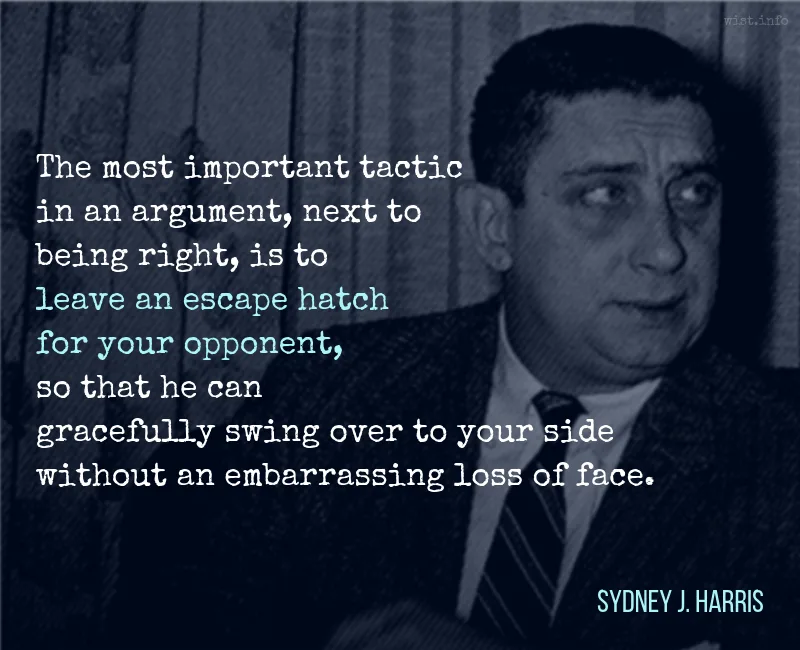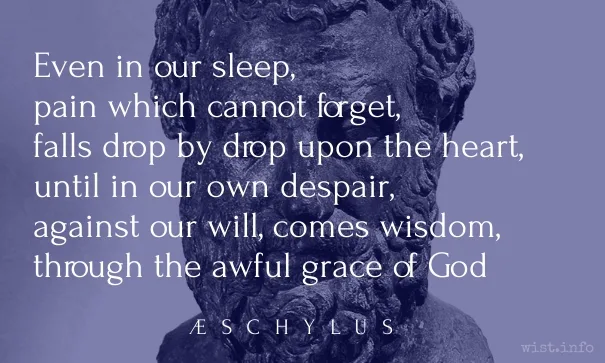If grace be grace, and Allah gracious be,
Adam from Paradise why banished He?
Grace to poor sinners shown is grace indeed;
In grace hard earned by works no grace I see.Omar Khayyám (1048-1123) Persian poet, mathematician, philosopher, astronomer [عمر خیام]
Rubáiyát [رباعیات], [tr. Whinfield (1883), # 102]
(Source)
While numbered as # 102 in most locations, it is given as # 57 here.
I was unable to find alternate translations or analogs to this quatrain from Whinfield. The closest (but a bit of a stretch):If sinfully I drudge, where is Your mercy?
If clouds darken my heart, where is Your light?
Heaven rewards my practice of obedience;
Rewards well-earned are good -- but what of grace?
[tr. Graves & Ali-Shah (1967), # 86]
Quotations about:
grace
Note not all quotations have been tagged, so Search may find additional quotes on this topic.
“She chose her way and it’s taken her far out of reach of man’s mercy, if ever she’d lived to face trial. And now, I suppose,” he said, seeing his friend’s face still thoughtful and undismayed, “you will tell me roundly that God’s reach is longer than man’s.”
“It had better be,” said Brother Cadfael very solemnly, “otherwise we are all lost.”Ellis Peters (1913-1995) English writer, translator [pseud. of Edith Mary Pargeter, who also wrote under the names John Redfern, Jolyon Carr, Peter Benedict]
The Sanctuary Sparrow, ch. 14 (1983)
(Source)
Concluding words of the book.
MALCOLM: Angels are bright still, though the brightest fell.
Though all things foul would wear the brows of grace,
Yet grace must still look so.William Shakespeare (1564-1616) English dramatist and poet
Macbeth, Act 4, sc. 3, l. 27ff (4.3.27-30) (1606)
(Source)
“God resolves all given time,” said Cai philosophically and trudged away into darkness. And Cadfael returned along the path with the uncomfortable feeling that God, nevertheless, required a little help from men, and what he mostly got was hindrance.
Ellis Peters (1913-1995) English writer, translator [pseud. of Edith Mary Pargeter, who also wrote under the names John Redfern, Jolyon Carr, Peter Benedict]
A Morbid Taste for Bones, ch. 3 (1977)
(Source)
Let Tom and Jane not think, because they see
one man is picking pockets and another
is offering all his goods to charity,
that they can judge their neighbors with God’s eyes:
for the pious man may fall, and the thief may rise.[Non creda donna Berta e ser Martino,
per vedere un furare, altro offerere,
vederli dentro al consiglio divino;
ché quel può surgere, e quel può cadere.]Dante Alighieri (1265-1321) Italian poet
The Divine Comedy [Divina Commedia], Book 3 “Paradiso,” Canto 13, l. 139ff (13.139-142) [Thomas Aquinas] (1320) [tr. Ciardi (1970)]
(Source)
Berta and Martino were common names in Dante's era, and stand in for "ordinary people" (with a sarcastic hint of pretension by giving them minor titles). Most translators use a straight translation of the names to Bertha and Martin; others change them to something more modern to reflect their everyman status.
(Source (Italian)). Alternate translations:The pious man
May fail ; the Penitent, altho' by spoil
He liv'd, may purchase Heav'n by arduous toil
Ere death: it is not our's their fate to scan.
[tr. Boyd (1802), st. 24]Seeing one steal,
Another bring, his offering to the priest,
Let not Dame Bertha and Sir Martin thence
Into heav’n’s counsels deem that they can pry:
For one of these may rise, the other fall.
[tr. Cary (1814)]Let not Nun Bertha and Saint Martin try,
Seeing one offer, and another steal,
The counsel of the heaven from that to tell:
For this may rise again, and that may fall.
[tr. Bannerman (1850)]Let not Dame Bertha nor Ser Martin think,
Seeing one steal, another offering make,
To see them in the arbitrament divine;
For one may rise, and fall the other may.
[tr. Longfellow (1867)]Let not Dame Bertha and Master Martin deem, for seeing one steal, another make offerings, that they are seeing them within the Divine counsel; for that one may be exalted and this may fall.
[tr. Butler (1885)]Let not Dame Bertha nor Sir Martin deem,
Because they see one rob, another pray,
That they can pry within the will supreme;
For one can rise, and one can fall away.
[tr. Minchin (1885)]Let not dame Bertha and master Martin, seeing one rob, and another make offering, believe to see them within the Divine counsel: for the one may rise and the other may fall.
[tr. Norton (1892)]Let not Dame Bertha or Squire Martin think, if they perceive one steal and one make offering, they therefore see them as in the divine counsel; for the one yet may rise and the other fall.
[tr. Wicksteed (1899)]Let not Dame Bertha and Master Martin, when they see one rob and another make an offering, think they see them within the divine counsel; for the one may rise and the other fall.
[tr. Sinclair (1939)]Let no Dame Bertha or Sir Martin deem,
Because they see one steal and one give all,
They see as divine forethought seéth them;
For the one yet may rise and the other fall.
[tr. Binyon (1943)]Let Jack and Jill not think they see so far
That, seeing this man pious, that a thief,
They see them such as in God's sight they are,
For one may rise, the other come to grief.
[tr. Sayers/Reynolds (1962)]Let not dame Bertha and squire Martin, if they see one steal and one make offering, believe to see them within the Divine Counsel: for the one may rise and the other may fall.
[tr. Singleton (1975)]Let not every Bertha and Martin think
Because they see one a thief, another respectable,
That they see how they are in the eyes of God;
For one may rise, and the other one may fall.
[tr. Sisson (1981)]Let not Dame Bertha or Master Martin think
that they have shared God’s Counsel when they see
one rob and see another who donates:
the last may fall, the other may be saved.
[tr. Mandelbaum (1984)]No Mr. or Miss Know-It-All should think,
when they see one man steal and one give alms
that they are seeing them through God's own eyes,
for one may yet rise up, the other fall.
[tr. Musa (1984)]Let not dame Bertha and messer Martin believe, because they see one stealing, another offering, that they see them within God’s counsel,
for that one can rise up, and this one can fall.
[tr. Durling (2011)]Do not let Jack and Jill think, that if they see someone steal or another make offering they therefore see them as Divine Wisdom does, since the one may still rise, and the other fall.
[tr. Kline (2002)]And so when Mrs Smith and Mr Jones
see one man steal, another offer alms,
don’t let them think they see this in God’s plan.
The thief may rise, the other take a fall.
[tr. Kirkpatrick (2007)]Let not Dame Bertha and Master Martin,
when they see one steal and another offer alms,
think that they behold them with God's wisdom,
for the first may still rise up, the other fall.
[tr. Hollander/Hollander (2007)]Let not Mrs. Judy and Mister John,
Seeing one man steal but another before
The altar with offerings, think one is sinful,
The other's in Heaven -- for people rise and fall.
[tr. Raffel (2010)]
Each of you should use whatever gift you have received to serve others, as faithful stewards of God’s grace in its various forms.
[ἕκαστος καθὼς ἔλαβεν χάρισμα εἰς ἑαυτοὺς αὐτὸ διακονοῦντες ὡς καλοὶ οἰκονόμοι ποικίλης χάριτος Θεοῦ.]
The Bible (The New Testament) (AD 1st - 2nd C) Christian sacred scripture
1 Peter 4:10 [NIV (2011 ed.)]
(Source)
(Source (Greek)). Alternate translations:As every man hath received the gift, even so minister the same one to another, as good stewards of the manifold grace of God.
[KJV (1611)]Each one of you has received a special grace, so, like good stewards responsible for all these different graces of God, put yourselves at the service of others.
[JB (1966)]Each one, as a good manager of God's different gifts, must use for the good of others the special gift he has received from God.
[GNT (1976)]Each one of you has received a special grace, so, like good stewards responsible for all these varied graces of God, put it at the service of others.
[NJB (1985)]And serve each other according to the gift each person has received, as good managers of God’s diverse gifts.
[CEB (2011)]Like good stewards of the manifold grace of God, serve one another with whatever gift each of you has received.
[NRSV (2021 ed.)]
The rule is, we are to Give as we would Receive, cheerfully, quickly, and without Hesitation; for there’s no Grace in a Benefit that sticks to the fingers.
Seneca the Younger (c. 4 BC-AD 65) Roman statesman, philosopher, playwright [Lucius Annaeus Seneca]
Morals, Part 1 “Of Benefits,” ch. 7 “The Manner of Obliging” [tr. L’Estrange (1693)]
(Source)
Wherefore, we must not think it sufficient that we do any thing merely well; but we ought to make it our study to do every thing gracefully also.
[Non si dèe adunque l’uomo contentare di fare le cose buone, ma dèe studiare di farle anco leggiadre.]
Giovanni della Casa (1503-1556) Florentine poet, author, diplomat, bishop
Galateo: Or, A Treatise on Politeness and Delicacy of Manners [Il Galateo overo de’ costumi], ch. 28 (1558) [tr. Graves (1774)]
(Source)
(Source (Italian)). Alternate translations:It is not inoughe for a man, to doe things that be good: but hee must also have a care, hee doe them with a good grace.
[tr. Peterson (1576)]Therefore, a man must not be content with doing what is good, but he must also seek to do it gracefully.
[tr. Einsenbichler/Bartlett (1986)]A man must therefore not be content to do things well, but must also aim to do them gracefully.
So everything that slows us down and forces patience, everything that sets us back into the slow circles of nature, is a help. Gardening is an instrument of grace.
May Sarton (1912-1995) Belgian-American poet, novelist, memoirist [pen name of Eleanore Marie Sarton]
Journal of a Solitude (1973)
(Source)
Glamour. Elves are beautiful. They’ve got style. Beauty. Grace. That’s what matters. If cats looked like frogs we’d realize what nasty, cruel little bastards they are. Style. That’s what people remember.
Beauty without grace, is a hook without a bait.
Anne "Ninon" de l'Enclos (1620-1705) French author, courtesan, patron of the arts [Ninon de Lenclos, Ninon de Lanclos]
The Memoirs of Ninon de L’Enclos, Vol. 1, “Life and Character” (1761)
(Source)
Ralph Waldo Emerson used almost precisely the same phrase in "Beauty," The Conduct of Life (1860).
You can have the other words — chance, luck, coincidence, serendipity. I’ll take grace. I don’t know what it is exactly, but I’ll take it.
For the holy are susceptible too to evil, even as you and I, signori; they too are helpless before sin without God’s aid. … And the holy can be fooled by sin as quickly as you or I, signori. Quicker, because they are holy.
I’ve seen the meanness of humans till I don’t know why God ain’t put out the sun and gone away.
Cormac McCarthy (1933-2023) American novelist, playwright, screenwriter
Outer Dark, ch. 17 (1968)
(Source)
The most important tactic in an argument, next to being right, is to leave an escape hatch for your opponent, so that he can gracefully swing over to your side without an embarrassing loss of face.
Sydney J. Harris (1917-1986) Anglo-American columnist, journalist, author
Pieces of Eight (1982)
(Source)
Frequently misquoted: "The most important thing in an argument, next to being right, is to leave an escape hatch for your opponent, so that he can gracefully swing over to your side without too much apparent loss of face."
You may rejoice to think yourselves secure,
You may be grateful for the gift divine,
That grace unsought which made your black hearts pure
And fits your earthborn souls in Heaven to shine.
But is it sweet to look around and view
Thousands excluded from that happiness,
Which they deserve at least as much as you,
Their faults not greater nor their virtues less?Anne Brontë (1820-1849) British novelist, poet [pseud. Acton Bell]
“A Word to Calvinists” (28 May 1843)
(Source)
I think all Christians would agree with me if I said that though Christianity seems at first to be all about morality, all about duties and rules and guilt and virtue, yet it leads you on, out of all that, into something beyond.
C. S. Lewis (1898-1963) English writer, literary scholar, lay theologian [Clive Staples Lewis]
Mere Christianity, “Faith” (1952)
(Source)
Deliberate with caution, but act with decision; and yield with graciousness, or oppose with firmness.
Charles Caleb "C. C." Colton (1780-1832) English cleric, writer, aphorist
Lacon: Or, Many Things in Few Words, Vol. 1, § 284 (1820)
(Source)
Grace is beauty in action.
Joseph Joubert (1754-1824) French moralist, philosopher, essayist, poet
(Attributed)
Sometimes attributed to Pensées (1838), but not found in any translation.
Somewhat more often attributed to Benjamin Disraeli. He did use the phrase (e.g., "Grace indeed is beauty in action" in Conington, Book 6, ch. 2 (1844)), but does not seem to have originated it. For example, in a speech in the House of Commons (1851-02-11), he is recorded as:A great writer has said that "grace is beauty in action." I say that Justice is truth in action.
Unless Disraeli was quoting himself as a "great writer," it seems likely he had someone else in mind.
Beauty loses its relish; the Graces, never: After the longest acquaintance, they are no less agreeable than at first.
Henry Home, Lord Kames (1696-1782) Scottish jurist, agriculturalist, philosopher, writer
Introduction to the Art of Thinking, ch. 4 (1761)
(Source)
Gentleness is everywhere in daily life, a sign that faith rules through ordinary things: through cooking and small talk, through storytelling, making love, fishing, tending animals and sweet corn and flowers, through sports, music and books, raising kids — all the places where the gravy soaks in and grace shines through.
Kindness consists in part, perhaps, in esteeming and loving people more than they deserve; but then there is a measure of prudence in believing that people are not always equal to what they are taken for.
[Une partie de la bonté consiste peut-être à estimer et à aimer les gens plus qu’ils ne le méritent; mais alors une partie de la prudence est de croire que les gens ne valent pas toujours ce qu’on les prise.]Joseph Joubert (1754-1824) French moralist, philosopher, essayist, poet
Pensées [Thoughts], ch. 5 “Des Passions et des Affections de l’Âme [On the Soul],” ¶ 66 (1850 ed.) [tr. Attwell (1896), ¶ 71]
(Source)
(Source (French)). Alternate translation:A part of goodness consists, perhaps, in esteeming and loving people more than they deserve; but then a part of prudence is to believe that people are not always worth what we rate them at.
[tr. Calvert (1866), ch. 5]
Commonly truncated and paraphrased as:A part of kindness consists in loving people more than they deserve.
[E.g. (1935)]
(Sometimes the "A part of" is left off as well.)
For man proposes but God disposes. The path a person takes does not lie within himself.
[Nam homo proponit, sed Deus disponit, nec est in homine via ejus.]
Thomas à Kempis (c. 1380-1471) German-Dutch priest, author
The Imitation of Christ [De Imitatione Christi], Book 1, ch. 19, v. 2 (1.19.2) (c. 1418-27) [tr. Creasy (1989)]
(Source)
Thomas saying that, regardless of a person's good intentions to act virtuously, they are dependent on God's grace to make that actually happen.
The phrase "Man proposes but God disposes" (or the Latin original of it) was coined by Thomas, which makes it ironic where some later translators put it in quotations or self-referent indeeds.
The text given relates to, is frequently footnoted to, and even is quoted directly from:
- Proverbs 16:9 ("A man's heart deviseth his way: but the Lord directeth his steps." [KJV])
- Jeremiah 10:23 ("O Lord, I know that the way of man is not in himself: it is not in man that walketh to direct his steps." [KJV])
(Source (Latin)). Alternate translations:For man purposeth, but God disposeth: nay, the way that man shall walk in this world is not in himself but in the grace of God.
[tr. Whitford/Raynal (1530/1871)]Man proposes, but God disposes. The way that a man shall walk in this world is found not in himself, but in the grace of God.
[tr. Whitford/Gardiner (1530/1955)]For man doth propose but God doth dispose, neither is the way of man in his owne hands.
[tr. Page (1639), 1.19.9]A Man's Heart deviseth his Way, but the Lord directeth his Steps, says Solomon: We may contrive and act as seems most adviseable; by which we do so, are from the Lord, so is the Event of our having done it entirely in his disposal.
[tr. Stanhope (1696; 1706 ed.), 1.19.3]Tho' the heart of man deviseth his way, yet the Lord ordereth the event; and that it is not in man that walketh, to direct his steps.
[tr. Payne (1803)]For man proposes, but God disposes; neither is the way of man in himself.
[Parker ed. (1841); Bagster ed. (1860); Anon. (1901)]For man proposes but GOD disposes: nor is it in man to direct his steps.
[tr. Dibdin (1851)]For man proposeth, but God disposeth; and the way of a man is not in himself.
[tr. Benham (1874)]For man, indeed, proposes but God disposes, and God's way is not man's.
[tr. Croft/Bolton (1940)]For man proposes, but God disposes, and a man's road is not within himself.
[tr. Daplyn (1952)]Man proposes, but God disposes, and man's destiny is not in his own hands.
[tr. Sherley-Price (1952)]They know that "man proposes, and God disposes"; the course of a man's life is not what he makes it.
[tr. Knox-Oakley (1959)]For man proposes, God disposes, and it is not for man to choose his lot.
[tr. Knott (1962)]Man indeed proposes, bit it is God who disposes nor is the course of man in his power as he goes his way.
[tr. Rooney (1979)]
I believe that appreciation is a holy thing, that when we look for what’s best in the person we happen to be with at the moment, we’re doing what God does; so in appreciating our neighbor, we’re participating in something truly sacred.
Fred Rogers (1928-2003) American educator, minister, songwriter, television host ["Mister Rogers"]
Commencement Address, Marquette College (May 2001)
(Source)
Rogers used the same comment at the Middlebury College commencement.
If a man be gracious and courteous to strangers, it shows he is a citizen of the world, and that his heart is no island cut off from other lands, but a continent that joins to them.
Francis Bacon (1561-1626) English philosopher, scientist, author, statesman
“Of Goodness, and Goodness of Nature,” Essays, No. 13 (1625)
(Source)
Good Master, how shall I recount this Thine inestimable charity?
What return can I make for this vast boon? […]
What reward shall I give my God,
except my heart’s obedience to His command?
And Thy command is this:
that we love one another.
Zeus, who guided mortals to be wise,
has established his fixed law —
wisdom comes through suffering.
Trouble, with its memories of pain,
drips in our hearts as we try to sleep,
so men against their will
learn to practice moderation.
Favours come to us from gods
seated on their solemn thrones —
such grace is harsh and violent.τὸν φρονεῖν βροτοὺς ὁδώ-
σαντα, τὸν [πάθει μάθος]
θέντα κυρίως ἔχειν.
στάζει δ’ ἀνθ’ ὕπνου πρὸ καρδίας
μνησιπήμων πόνος· καὶ παρ’ ἄ-
κοντας ἦλθε σωφρονεῖν.
δαιμόνων δέ που χάρις βίαιος
σέλμα σεμνὸν ἡμένων.Aeschylus (525-456 BC) Greek dramatist (Æschylus)
Agamemnon, ll. 175-183 [tr. Johnston (2007)]
(Source)
Alt. trans.:The first Hamilton alternate was used, slightly modified, by Robert Kennedy in his speech on the assassination of Martin Luther King, Jr. (4 Apr 1968). Kennedy's family used it as an epitaph on his grave Arlington National Cemetery: "Even in our sleep, pain which cannot forget, falls drop by drop upon the heart, until in our own despair, against our will, comes wisdom, through the awful grace of God."
- "It is through suffering that learning comes." [In Arnold Toynbee, "Christianity and Civilization" (1947), Civilization on Trial (1948)]
- "God, whose law it is that he who learns must suffer. And even in our sleep pain that cannot forget, falls drop by drop upon the heart, and in our own despite, against our will, comes wisdom to us by the awful grace of God." [tr. Hamilton (1930)]
- "Guide of mortal man to wisdom, he who has ordained a law, knowledge won through suffering. Drop, drop -- in our sleep, upon the heart sorrow falls, memory’s pain, and to us, though against our very will, even in our own despite, comes wisdom by the awful grace of God." [tr. Hamilton (1937)]
See here for more discussion.
I know a number of highly sensitive and intelligent people in my own communion who consider as a heresy my faith that God’s loving concern for his creation will outlast all our willfulness and pride. No matter how many eons it takes, he will not rest until all of creation, including Satan, is reconciled to him, until there is no creature who cannot return his look of love with a joyful response of love […] Some people feel it to be heresy because it appears to deny man his freedom to refuse to love God. But this, it seems to me, denies God his freedom to go on loving us beyond all our willfulness and pride. If the Word of God is the light of the world, and this light cannot be put out, ultimately it will brighten all the dark corners of our hearts and we will be able to see, and seeing, will be given the grace to respond with love — and of our own free will.
OLIVER: Kindness, nobler ever than revenge.
William Shakespeare (1564-1616) English dramatist and poet
As You Like It, Act 4, sc. 3, l. 135 (4.3.135) (1599)
(Source)































